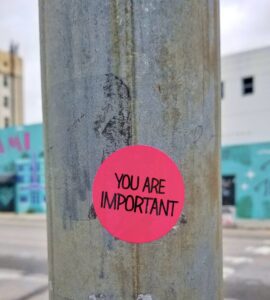Two little words most of us say many, many times a day in general conversation – but have you ever really considered the power of thank you?
In thanking someone, whether it’s the simple courtesy of acknowledging someone who holds the door open for you or showing gratitude to the server for making you a coffee, you are creating a relationship, albeit a temporary one. That kind of thank you makes the other person feel valued, even if it’s for a brief moment.
A genuine thank you – a thank you for being there, thank you for thinking of me, thank you for supporting me – that kind of thank you has the power to change someone’s day. And we all know when we are thanked from the heart how much our mental health and well-being improves. A genuine thank you has the power to not only improve one-to-one relationships, but the ability to bring entire groups of people together.
So how often do you say thank you to your supporters? Common sense might suggest you try to do this every time a supporter has done something for you, and of course, thanking someone for their time and money straight after they’ve given it is absolutely the right thing to do.
But how do you say thank you? By an email, which can get relegated to the spam folder? By a mailshot, which is filed in the bin? A social media post, easily missed? Or by a telephone call, and the opportunity to have an unscripted and personal conversation with a supporter and bring them closer to your charity?
During the pandemic, we saw the volume of thank you calls rocket sky high. This was especially interesting, because due to the restrictions, very few charities were in the position to recruit new members or supporters. Of course, some charities chose the pandemic as a good opportunity to address the backlog of welcome/thank you calls to recently signed up members. But the really savvy charities chose to thank people wherever they were on their supporter journey, as a way of connecting, perhaps following up on a donation with an update on progress, simply thanking people for the length of their support, or even on the anniversary of their gift.
And these calls contributed significantly to deepening existing relationships between supporters and charities. They presented brilliant opportunities to communicate current messages and were incredibly helpful in keeping supporters in the loop and on board during a difficult time.
This is best confirmed by Saira Rahim, Individual Giving Manager at JDRF*:
“The campaign reinforced our belief that thank you calls are worth it! These campaigns are our chance to show supporters how much we appreciate them and to get to know them better. The best thing about the campaign was seeing how delighted some of our supporters were to receive the call and what it meant to them. We listened to call recordings where supporters happily chatted away with QTS staff. And it’s fair to say we couldn’t have done better ourselves! We’ve always been impressed with the warmth and friendliness that QTS display when talking to our supporters, but it was something else to see this during such uncertain times.”

The thank you call is also an ideal opportunity to check with regular givers that they are comfortable with their current commitment during a possible time of hardship, and for those who are struggling, the chance to offer payment holidays or downgrade their payments. Interestingly, of the hundreds of thousands of calls we made during the pandemic, the number of supporters who opted for a payment holiday, downgrade or cancel numbered less than 1%. Instead, we actually witnessed a natural upgrade from supporters by around 3%, and a Gift Aid sign up rate of about 25% of those we spoke with.
Colette Glynn, Digital & Campaigns Manager at Erskine** provided this feedback on a recent thank you campaign:
“Our lifetime value/thank you calls are a great way to update our regular givers with how their donations are making a difference. QTS callers have made these campaigns a great success over the years. The calls not only help with reducing attrition rates, but also have the added bonus of some donors offering to upgrade their gift. We believe this is achieved because QTS callers know Erskine so well and make it a really personal call with our supporters. Nearly 10% of our supporters upgraded in our latest campaign – without QTS callers even asking!”
MD at QTS Ben Suffell sums up: “As an admin call, with no selling involved, we can phone every supporter you have a telephone number for. We have seen how thanking supporters by phone is really powerful for improving retention – but also there is often the additional benefit of upgrades, unprompted donations or sign ups to Gift Aid. Meanwhile it shows donors you really care about them through this testing time. Our recent experience shows how thank you calls are an excellent campaign option for any charity right now.”
Reconsidering the power of thank you? Drop us a line – we’d love to support you.
* JDRF is committed to eradicating type 1 diabetes. JDRF research has led to new developments in diabetes technology and treatment and is laying the foundations for a cure. They support everyone living with type 1 diabetes, by working with policy makers to increase availability of treatments and by providing information and resources to help people manage their condition.
**Erskine provides unrivalled nursing, residential, respite and dementia care in four homes throughout Scotland. Erskine also assists younger Veterans who need help to begin the next chapter of their lives, offering social, recreation and training facilities at its Activity Centre and accommodation in the form of Transitional Supported Apartments.


